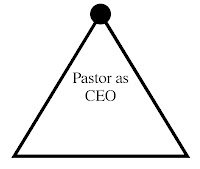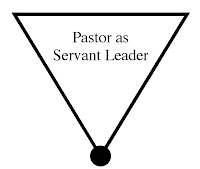In the church, a typical model of leadership, borrowing from corporate structure, looks like this:
 Since this model implies dominance by those "in charge of" or "over" other people, and since Jesus exemplified and taught a different model, another example is this:
Since this model implies dominance by those "in charge of" or "over" other people, and since Jesus exemplified and taught a different model, another example is this:
Either of these images make sense within the context of a growing organization but, while the second is certainly different from the first on paper, it does not always look different in practice. In either model the more people there are in the organization, the more pressure there is on the pastor to be-all and do-all. For health, both models need to follow the advice Moses received from his father-in-law.
But in the Pastor as Servant Leader model, even with various levels of leadership, the heaviest weight still rests squarely on the shoulders of one person, requiring the mythic strength of Atlas.
 In describing the influence of leadership, noted Leadership Expert John Maxwell uses this word-picture:
In describing the influence of leadership, noted Leadership Expert John Maxwell uses this word-picture:"A gentle leaf drifts slowly to the waters surface - it gracefully steps on the tranquil pond and as if timed by a masterful conductor, ripples radiate from the leaf across the water. Such a gentle touch - but noticeable, felt results. A leader's touch - no matter how small - yields the same effect. Like falling dominoes, the effect of a leader's influence creates a chain reaction which reverberates throughout an organization."While that analogy is valid (and certainly picturesque), I disagree with his sound-byte assertion: "Everything rises and falls on leadership".
I think a more apt paraphrase of Jesus' message about leadership would be:
Everything rises and falls on Love.I still think the advice Moses got from his father-in-law was right though: as an organization grows, more structural support is needed.
You can lead without loving,
but if you truly love people
then as a natural result
they will be led to Me.
Cathy & I have set out together on an adventure of starting a community of faith called The Orchard within the greater context of our experiences in the Vineyard movement (so, yes, you could say we are "planting a church").
But what if I don't want to start and grow an organization? What if, instead, I want to foster the growth of an organism -- a living breathing changing thing that has a life of its own? I believe this is how communities of faith -- how churches -- are supposed to be. When a child is conceived, it starts out very small; just a couple cells. As the child grows, the various structures grow and stretch and transform in exactly the ways they need to in order to support the overall life of the child. Bones thicken and harden; tissues lengthen and stretch; organs and body systems become more complex -- yet lose none of their simplistic elegance in actual functionality.
A few years ago I became more and more unsatisfied with the shortcomings of both the models for leadership given above. I began seeing instead a new image as a way to help me understand this idea of growth combined with a leader being the starting point for a foundation of loving leadership:

As the organism (or organization) grows, there is still influential leadership which supports the overall life. This is not a "leaderless" system. But unlike "Pastor as CEO", this model does not set the Pastor up as an autocratic, albeit benevolent, ruler of his/her own small kingdom. And unlike "Pastor as Servant leader" this new model does not see the Pastor bearing the crushing weight of trying to fill a be-all end-all savior/messiah role. Instead, in the model of "Pastor as Start of Foundation", any and all organism growth sees the Pastor naturally sharing more and more with a growing foundation of loving people among whom the overall weight of responsible leadership is distributed.
This has been my view of the kind of leadership I want to exemplify. As a leader I want to foster growth in others of whatever God has planted within them so that as a community we can each/all then give away those gifts to the world around us as a way of expressing God's love and care to everyone with whom we have any relationship or passing contact.
Here was my "Aha!" moment:
This morning I read something which moved me beyond the triangular, pyramidal models I've been talking about so far. I love this quote from Celtic Daily Prayer:
"BE HELPFUL WHEN YOU ARE AT THE BOTTOM OF THE LADDER AND BE THE LOWEST WHEN YOU ARE IN AUTHORITY
Too many of our models for authority are ones of hierarchy or domination. We think of rulers and leaders as those who are over other people and supported by them. Instead of a pyramid model where the few dominate the many, in God's Kingdom it is more helpful to picture a huge saucer into which is thrown all the people of God in all their giftedness, from the least to the greatest. Those more strongly gifted for ministry will not rise to the top, but sink to the bottom where they may undergird and provoke the rest of the people of God.
One true example of Christian humility was King Oswald of Northumbria who himself willingly worked as an interpreter for Aidan so that his people might receive the gospel."
 As I shared this with Cathy, she pointed out to me how King Oswald had been a living example of Jesus Himself, who willingly set aside His Kingship and in order to faithfully translate the good news into incarnational language we could understand and receive.
As I shared this with Cathy, she pointed out to me how King Oswald had been a living example of Jesus Himself, who willingly set aside His Kingship and in order to faithfully translate the good news into incarnational language we could understand and receive.May I be fortunate enough to be counted among those who let go of what the rest of the world sees as important in order to reach for the fullness of whatever God has placed inside me to give away to Him and to those He loves so dearly.
~ Keith
3 comments:
y-e-s!! What exciting news!
Your article is worth reading if for no other reason than to make it to the end and see your final thought/prayer: "May I be fortunate enough to be counted among those who let go of what the rest of the world sees as important in order to reach for the fullness of whatever God has placed inside me to give away to Him and to those He loves so dearly."
Since I work with pastors I'm continually concerned about the pressures, often times self imposed, place upon them. Your thoughts suggest a model that is more about distributing the weight than it is about any single individual (the pastor) taking it all on themselves. Balance, distribution. In the movie "The Incredibles" the son, Dash, makes the comment: If everyone is special, then no one is special.
Some voices today suggest that we don't need leaders. We are all leaders. Well if everyone is a leader, then no on is a leader. What we need is to nurture a new type of leader, a type that is healthier for the leader and those he/she is leading.
Dave Jacobs
Small Church Pastor
Keith,
Great thoughts. If more "plants" began this way today I think it would make all the difference in world. I wonder what the implications would be for those that are church planting coaches if they were able to adapt a model of leadership development that followed your thoughts through to the actual practice...most younger folks I talk with that want to be about the Kingdom don't want the 90's model of CEO leadership...they want a more organic community that is focused around daily living out their faith together not focused around growing a Sunday a.m. meeting...keep writing!
Post a Comment